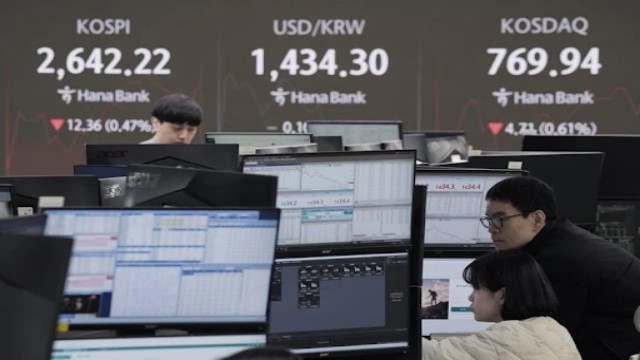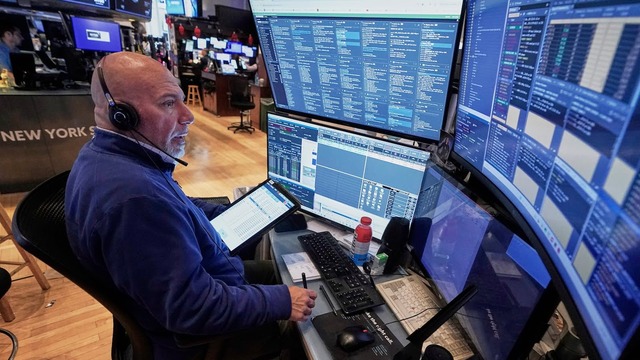
Currency traders monitor market movements at the KEB Hana Bank headquarters in Seoul, South Korea, on Monday, February 24, 2025. Screens display the Korea Composite Stock Price Index (KOSPI) and the exchange rate between the U.S. dollar and the South Korean won. (AP Photo/Ahn Young-joon)
Asian stock markets showed mixed results on Monday following a sharp decline in U.S. stocks. Investors remained on edge due to concerns over President Donald Trump's economic policies, particularly tariffs and government spending cuts.
Asian Markets React to U.S. Slump
With Tokyo markets closed for a holiday, Hong Kong’s Hang Seng Index dropped 0.6% to 23,348.82, and the Shanghai Composite fell slightly by 0.1% to 3,375.29. In contrast, Australia’s S&P/ASX 200 inched up less than 0.1% to 8,300.80. Meanwhile, South Korea’s Kospi slipped 0.7% to 2,636.55, Taiwan’s Taiex declined 0.6%, and India’s Sensex slid 0.9%.
U.S. Stocks Face Biggest Drop in Months
On Friday, Wall Street saw significant losses. The S&P 500 recorded its worst session in two months, plunging 1.7% to 6,013.13. The Dow Jones Industrial Average tumbled 748 points, or 1.7%, to 43,428.02, while the Nasdaq sank 2.2% to 19,524.01. The market downturn was triggered by weaker-than-expected economic reports, fueling concerns over slowing business activity and rising inflation.
Business Activity Nears Stagnation
A report from S&P Global revealed that U.S. business growth has slowed to a 17-month low, with the service sector unexpectedly shrinking. Companies cited uncertainty over government policies, including potential tariff hikes, as a major concern. Higher costs, driven by tariffs on imported goods, have also strained businesses.
Ken Wattret, a global economist at S&P Global, noted that weak trade and lower investment are dragging down global economic growth. Predictions suggest that quarter-over-quarter GDP growth rates may decline this year.
Rising Inflation Worries Consumers
Another report indicated that U.S. consumers expect inflation to rise, driven by potential tariffs. A University of Michigan survey found that people now anticipate prices to increase by 4.3% over the next year, up from the 3.3% prediction made last month. This rising inflation expectation adds to economic uncertainty.
Housing Market Struggles Amid High Mortgage Rates
A separate report showed that sales of previously owned homes were weaker than expected. High mortgage rates and expensive home prices continue to weigh on the housing market, further slowing economic activity.
Small Stocks Take the Hardest Hit
The Russell 2000 index, which tracks smaller companies more closely tied to the U.S. economy, dropped significantly, leading the market’s losses. Akamai Technologies saw the sharpest decline in the S&P 500, falling 21.7%. Despite strong earnings, its future revenue projections disappointed investors, triggering a sell-off.
Fed Holds Interest Rates Steady Amid Economic Uncertainty
Before Friday’s steep drop, U.S. markets had been relatively stable, buoyed by strong corporate earnings. However, persistent inflation concerns have limited expectations for interest rate cuts by the Federal Reserve. The Fed has kept rates unchanged, citing uncertainties around Trump’s tariff plans and immigration policies. While lower rates could stimulate growth, they might also worsen inflation.
Oil Prices and Currency Movements
In commodities trading, U.S. benchmark crude fell 21 cents to $70.19 per barrel, while Brent Crude slipped 17 cents to $73.88 per barrel. The U.S. dollar strengthened slightly against the yen, rising to 149.28 from 149.24, while the euro climbed to $1.0512 from $1.0462.















